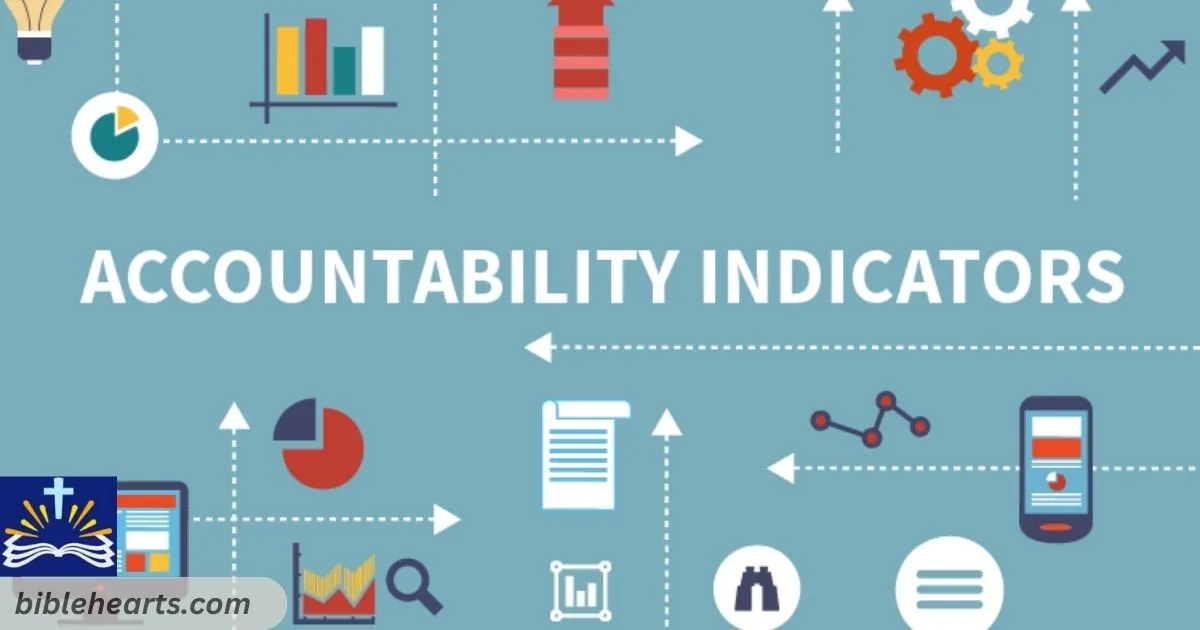“Embracing accountability through Scripture inspires personal growth, responsibility, and integrity in our daily lives.”
Accountability is a crucial part of living a life aligned with biblical principles. The Bible emphasizes the importance of being responsible not only for our actions but also for how we treat others.
It challenges us to live with integrity, answer for our behaviors, and encourage one another to grow in faith and righteousness. In today’s fast-paced world, accountability often feels like a forgotten value. Many people avoid responsibility or shift blame, but the Bible calls us to a higher standard.
Scripture encourages us to live transparently, seeking wisdom from God and from each other. Accountability fosters personal development and strengthens our relationships, both with God and with fellow believers.
This blog will walk you through several Bible verses that address the subject of accountability. We’ll explore how Scripture highlights personal responsibility, integrity, and the power of mutual encouragement. Alongside the verses, you’ll find practical real-life examples that illustrate how accountability plays out in our modern-day lives.
1. Bible Verses on Personal Accountability
- Romans 14:12 – “So then, each of us will give an account of ourselves to God.”
- 2 Corinthians 5:10 – “For we must all appear before the judgment seat of Christ, so that each of us may receive what is due us for the things done while in the body, whether good or bad.”
- Proverbs 27:17 – “As iron sharpens iron, so one person sharpens another.”
- Galatians 6:5 – “For each will have to bear his own load.”
- 1 Peter 4:5 – “But they will have to give account to him who is ready to judge the living and the dead.”
- Matthew 12:36 – “But I tell you that everyone will have to give account on the day of judgment for every empty word they have spoken.”

Real-Life Example:
Imagine a manager at work who struggles with micromanaging his team. After a conversation with his pastor, he realizes that his behavior stems from avoiding responsibility for his own work. By accepting his mistakes and holding himself accountable, he becomes a better leader and earns his team’s respect.
2. Accountability in Relationships
- James 5:16 – “Therefore confess your sins to each other and pray for each other so that you may be healed.”
- Ephesians 4:25 – “Therefore each of you must put off falsehood and speak truthfully to your neighbor, for we are all members of one body.”
- Ecclesiastes 4:9-10 – “Two are better than one because they have a good return for their labor: If either of them falls down, one can help the other up.”
- Matthew 18:15 – “If your brother or sister sins, go and point out their fault, just between the two of you.”
- Colossians 3:16 – “Let the message of Christ dwell among you richly as you teach and admonish one another.”
- Proverbs 27:6 – “Wounds from a friend can be trusted, but an enemy multiplies kisses.”

Real-Life Example:
A married couple struggles with communication issues. After reading James 5:16, they decide to openly confess their frustrations and pray for one another. By holding each other accountable with love, their relationship grows stronger.
3. Accountability Before God
- Hebrews 4:13 – “Nothing in all creation is hidden from God’s sight. Everything is uncovered and laid bare before the eyes of him to whom we must give account.”
- Proverbs 5:21 – “For your ways are in full view of the Lord, and he examines all your paths.”
- Psalm 139:23-24 – “Search me, God, and know my heart; test me and know my anxious thoughts. See if there is any offensive way in me, and lead me in the way everlasting.”
- 1 Corinthians 4:5 – “He will bring to light what is hidden in darkness and will expose the motives of the heart.”
- 2 Chronicles 16:9 – “For the eyes of the Lord range throughout the earth to strengthen those whose hearts are fully committed to him.”
- Matthew 25:19 – “After a long time the master of those servants returned and settled accounts with them.”

Real-Life Example:
A businessman who regularly cuts corners to maximize profits begins to feel convicted after reading Hebrews 4:13. He repents, knowing that God sees all his actions, and changes his business practices to align with biblical integrity.
4. Accountability Through Community
- 1 Thessalonians 5:11 – “Therefore encourage one another and build each other up, just as in fact you are doing.”
- Galatians 6:1-2 – “Brothers and sisters, if someone is caught in a sin, you who live by the Spirit should restore that person gently.”
- Hebrews 10:24-25 – “And let us consider how we may spur one another on toward love and good deeds, not giving up meeting together.”
- Romans 12:5 – “So in Christ we, though many, form one body, and each member belongs to all the others.”
- Colossians 3:13 – “Bear with each other and forgive one another if any of you has a grievance.”
- 1 Corinthians 12:26 – “If one part suffers, every part suffers with it; if one part is honored, every part rejoices with it.”

Real-Life Example:
A church member facing a moral dilemma is hesitant to share it with anyone. Encouraged by Galatians 6:1-2, a close friend from his Bible study group gently confronts him, helping him overcome the issue and stay accountable in his walk with God.
5. Accountability in Leadership

- Luke 12:48 – “To whom much is given, much will be required.”
- 1 Timothy 3:1-2 – “Now the overseer is to be above reproach, faithful to his wife, temperate, self-controlled.”
- Titus 1:7-8 – “Since an overseer manages God’s household, he must be blameless.”
- Hebrews 13:17 – “Have confidence in your leaders and submit to their authority, because they keep watch over you as those who must give an account.”
- James 3:1 – “Not many of you should become teachers, because you know that we who teach will be judged more strictly.”
- Proverbs 16:12 – “Kings detest wrongdoing, for a throne is established through righteousness.”
Real-Life Example:
A church elder, aware of Luke 12:48, realizes that his influence comes with great responsibility. He strives to lead with humility and accountability, knowing that God holds leaders to a higher standard.
6. How Can We Encourage Accountability in Our Lives?
- Proverbs 12:1 – “Whoever loves discipline loves knowledge, but whoever hates correction is irrational.”
- Proverbs 19:20 – “Listen to advice and accept discipline, and at the end you will be counted among the wise.”
- Titus 2:7-8 – “In everything set them an example by doing what is good.”
- Proverbs 27:5 – “Better is open rebuke than hidden love.”
- Philippians 2:3-4 – “Do nothing out of selfish ambition or vain conceit. Rather, in humility value others above yourselves.”
- Psalm 141:5 – “Let a righteous man strike me—that is a kindness.”
Real-Life Example:
A woman in a small group Bible study decides to confront her friend with love about a behavior that is hindering her spiritual growth. Inspired by Proverbs 27:5, she realizes that sometimes tough love is the most accountable thing you can offer.
Why Is Accountability Important in Our Walk with God?
Accountability helps us stay on the right path and grow in faith. When we are accountable to others and to God, we are more likely to resist temptation, make wise choices, and live with integrity.
Accountability also fosters deeper connections in relationships, allowing us to receive and offer support in times of struggle. Scripture repeatedly shows that we are not meant to walk this journey alone, but with the support of others who will guide us towards righteousness.
Key Insight
- What is accountability according to the Bible?
Accountability in the Bible refers to taking responsibility for one’s actions, confessing sins, and helping others stay on the path of righteousness. - How can I practice accountability in my daily life?
You can practice accountability by being honest, seeking advice, confessing mistakes, and accepting correction from others. - Why is accountability important in Christian relationships?
Accountability helps build trust and fosters spiritual growth, allowing both parties to correct and encourage one another in faith. - Can accountability help in overcoming sin?
Yes, accountability can be a powerful tool in overcoming sin, as it encourages confession, repentance, and support from others. - How can I hold myself accountable to God?
You can hold yourself accountable to God by regularly examining your life, confessing sins, seeking guidance from Scripture, and praying for wisdom and strength.
Conclusion
Accountability is more than just a principle—it’s a biblical mandate that fosters spiritual growth and integrity. Through Scripture, we learn the importance of being responsible for our actions, encouraging others, and seeking accountability before God.
By embracing accountability, we not only improve ourselves but also strengthen our relationships and walk closer with God.

Hi! I’m Ethan Matthews, a tech enthusiast and avid traveler, sharing insights and adventures from my journeys around the globe.










